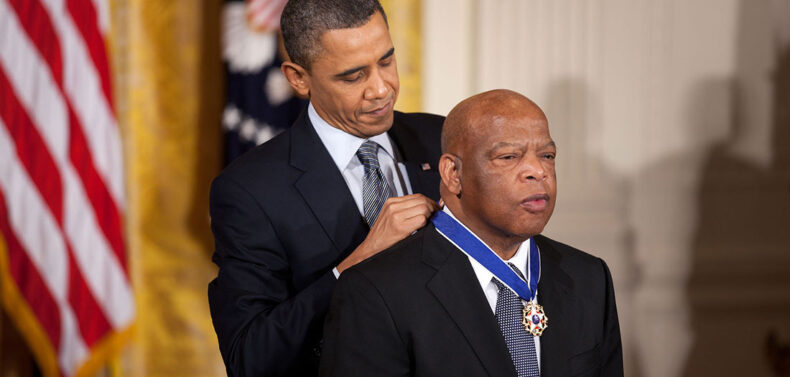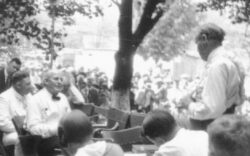Civil rights icon and American hero John Lewis died five years ago, on July 17, 2020, but his legacy of making “good trouble” in the pursuit of justice lives on.
Born in rural Alabama on Feb. 21, 1940, Lewis devoted his life to making positive changes in the South, across America and around the world. He was arrested more than 40 times during peaceful acts of civil disobedience, and he was the youngest person to speak at the historic March on Washington in 1963, when his mentor Martin Luther King Jr. gave the famous “I Have a Dream” speech to a teeming multitude in the nation’s capital.
Lewis is gone, but his courage and commitment will again be remembered on July 17, the fifth anniversary of his death, when Americans in hundreds of locales will take part in “Good Trouble Lives On” events to mark his death five years ago, and to continue his crusades today. According to the GoodTroubleLivesOn.org website, “The civil rights leaders of the past have shown us the power of collective action. That’s why, on July 17… communities across the country will take to the streets, courthouses and community spaces to carry forward his fight for justice, voting rights and dignity for all.”
It is fitting that today’s political activists remember the contributions of political pioneers like John Lewis. In 2011, during nationwide Occupy Wall Street protests against American plutocracy, Lewis was spurned by an Atlanta group after he walked from his downtown office to the nearby rally site. According to The Guardian, “Civil rights legend John Lewis turned up to address the crowd. But before he could speak, the occupiers first had to debate whether he should be allowed to speak, a process that… was destined to be lengthy.”
After 20 minutes of wasted time, Lewis finally had to leave for a previous engagement and the Occupy Atlanta movement was left looking obtuse for not letting a civil rights hero make a brief speech. Even during the 1963 March on Washington, Lewis spoke for only about seven minutes, and he wouldn’t have taken up much time had he been allowed to speak to Occupy Atlanta in 2011. Lewis showed no anger about the snub, but later told reporters that he was going to tell the crowd, “I stand with you. I support what you’re doing.”
Lewis was given plenty of time to speak here in Athens in 2003, when he addressed a large crowd at the Athens Human Rights Festival on College Square. I was honored to introduce Lewis, and his speech was greeted with respect and enthusiasm from the multiracial audience. An opponent of the Bush/Cheney administration’s Iraq War, Lewis spoke words in 2003 that are relevant today: “We have an administration in Washington, we have an attorney general, who in the name of a war on terrorism want to peek into people’s mail, spy on their computers and go into their bedrooms,” he thundered from the festival stage. “We have a right as citizens, not just as citizens of Georgia, not just as citizens of America, but as citizens of the world, as human beings, to be left alone.”
In his 80 years of life, John Lewis went from youthful activist to longtime service as a congressman who was called “the conscience of Capitol Hill.” It is fitting that he will be honored again on July 17 all across this land that he loved. Lewis was a shaper of history and he probably would be happy that the nearby town of Watkinsville recently erected a handsome historic marker to remind people of all races of a bloody lynching that happened there in 1905, when a mob invaded the Oconee County jail and then murdered eight prisoners who had been housed there.
The new marker for an old crime tells the story of the lynching, and says the marker “stands as a remembrance of the lives lost and as a testament to the ongoing efforts to acknowledge and confront the history of racial violence in Georgia.” John Lewis would be proud of Watkinsville’s history lesson. As he said, “The call of history is sounding again.”
Like what you just read? Support Flagpole by making a donation today. Every dollar you give helps fund our ongoing mission to provide Athens with quality, independent journalism.










